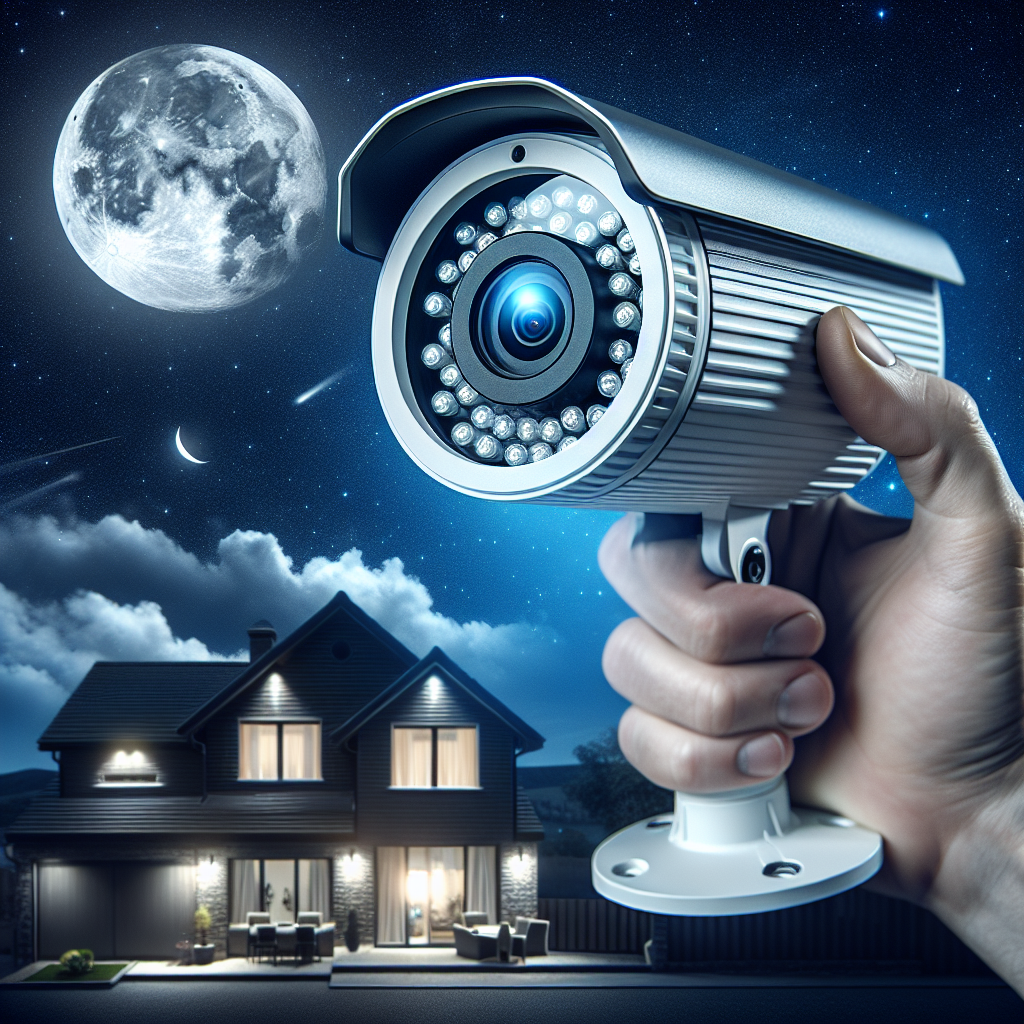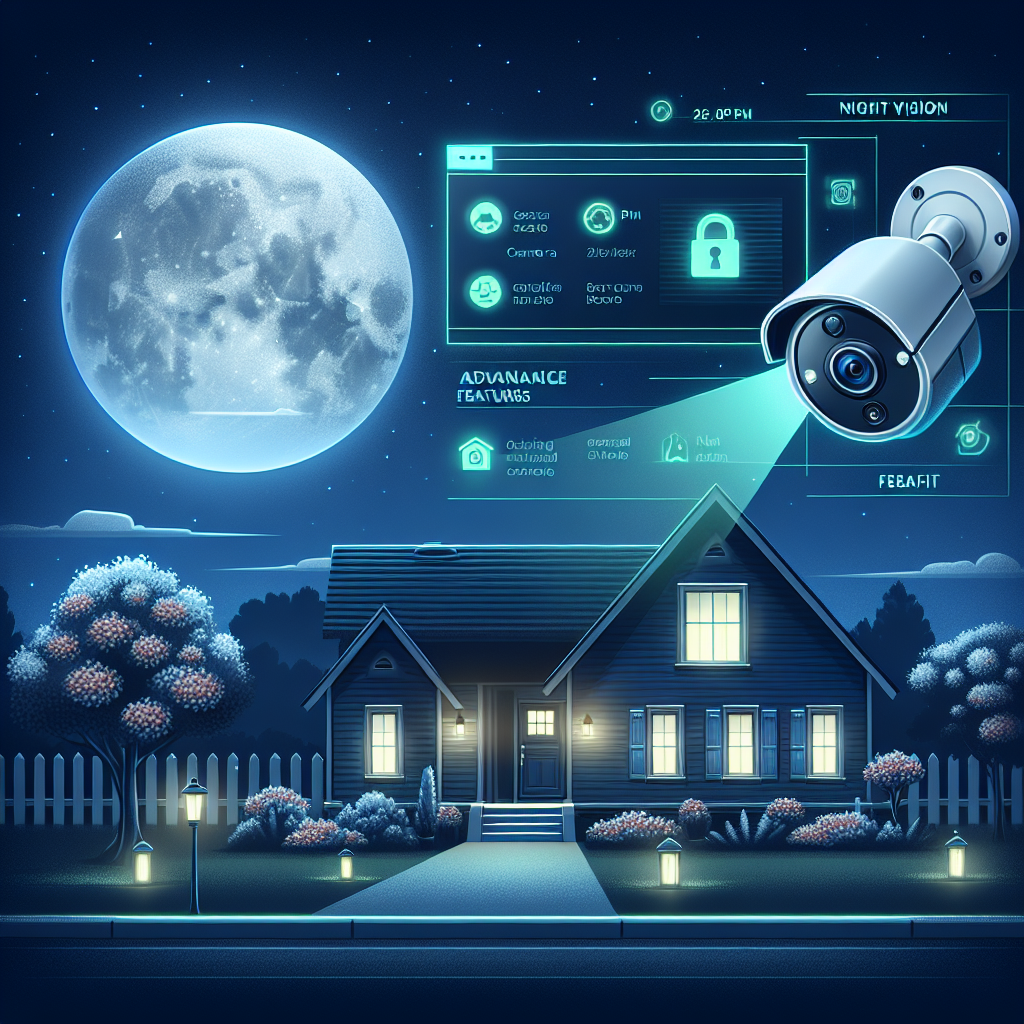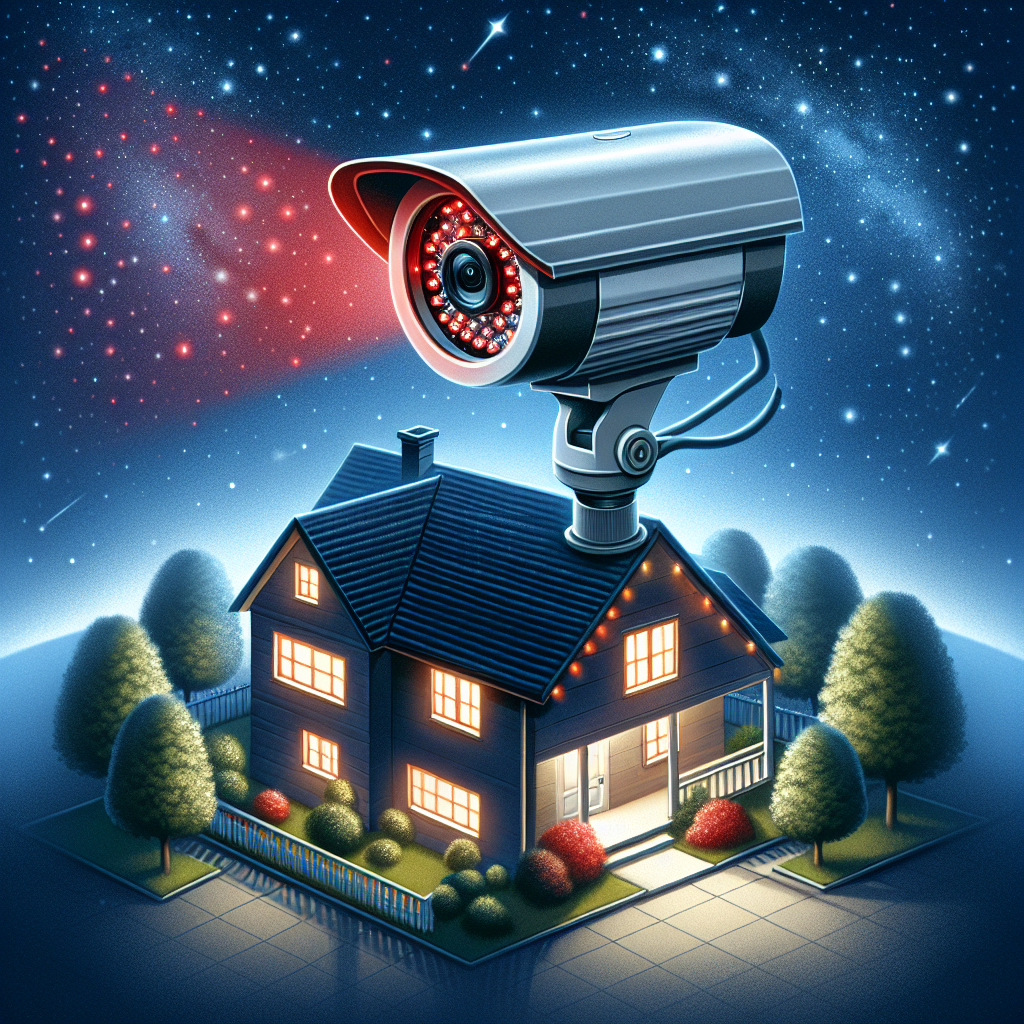When it comes to protecting your home, having a reliable security system is essential. One of the key components of any home security setup is a night vision security camera. These advanced cameras are equipped with infrared technology that allows them to capture clear, detailed images even in low light or complete darkness. In this article, we will explore the many benefits and features of night vision security cameras for home protection. From detecting unwanted visitors to keeping an eye on your property while you’re away, these cameras offer peace of mind and added security for you and your loved ones. Let’s dive into the world of night vision surveillance and discover how these cameras can enhance your home security system.
Understanding the Importance of Night Vision Security Cameras
Night vision security cameras play a crucial role in enhancing home protection by providing surveillance capabilities even in low-light or no-light conditions. These cameras are equipped with advanced technology that allows them to capture clear and detailed images in the dark, ensuring that any suspicious activity is detected promptly. The importance of night vision security cameras can be highlighted through the following points:
-
Enhanced Visibility: Night vision cameras use infrared technology to illuminate the area being monitored, enabling them to capture footage in complete darkness. This enhanced visibility ensures that homeowners can monitor their property effectively at all times, even during the night.
-
Deterrence of Intruders: The presence of night vision security cameras acts as a powerful deterrent to potential intruders. Knowing that their actions are being recorded even in the dark can discourage criminals from attempting to break into a property, thus enhancing overall home security.
-
Quick Detection of Threats: By providing clear footage in low-light conditions, night vision cameras enable homeowners to quickly detect any potential threats or suspicious activity around their property. This early detection can help prevent security breaches and allow for timely intervention if necessary.
-
Peace of Mind: The 24/7 surveillance capabilities of night vision security cameras offer homeowners peace of mind, knowing that their property is being monitored round the clock. This sense of security is invaluable, especially when it comes to protecting loved ones and valuable possessions.
In conclusion, the importance of night vision security cameras for home protection cannot be overstated. Their ability to provide enhanced visibility, deter intruders, detect threats quickly, and offer peace of mind makes them a valuable investment for any homeowner looking to strengthen their security measures.
Types of Night Vision Technology in Security Cameras
Infrared Night Vision
Types of Night Vision Technology in Security Cameras
Explanation of how infrared night vision works
Infrared night vision technology operates by utilizing infrared light, which is invisible to the human eye. Security cameras equipped with infrared night vision have sensors that can detect this light in the dark. When the ambient light levels drop below a certain threshold, the camera switches to infrared mode, allowing it to capture clear images even in complete darkness. The camera’s infrared LEDs emit infrared light, which bounces off objects and is then captured by the camera’s sensor to produce a visible image.
Pros and cons of using infrared night vision technology
Pros:
– Enhanced visibility in low-light conditions: With the ability to see in complete darkness, infrared night vision cameras provide round-the-clock surveillance for enhanced home security.
– Discreet operation: Since infrared light is invisible to the naked eye, these cameras can monitor without drawing attention to themselves, making them ideal for covert surveillance.
– Cost-effective: Infrared night vision technology is relatively affordable and offers reliable performance for home protection without the need for additional lighting.
Cons:
– Limited range: Infrared night vision cameras typically have a limited range of visibility in complete darkness, which may vary depending on the camera model.
– Potential for overexposure: In some cases, infrared night vision cameras may experience overexposure when faced with bright light sources in close proximity, leading to washed-out images.
– Black and white footage: Most infrared night vision cameras capture footage in black and white when operating in low-light conditions, which may affect the level of detail in the recorded video.
Starlight Night Vision
Overview of Starlight Night Vision Technology
Starlight night vision technology is a cutting-edge feature in security cameras that enhances visibility in low-light conditions. Unlike traditional infrared night vision, which relies on infrared light to capture images in the dark, starlight technology utilizes advanced sensors and image processing algorithms to produce clearer and more detailed footage even in extremely low-light environments. By leveraging the available ambient light, starlight night vision cameras can provide full-color images with impressive clarity, making them ideal for monitoring outdoor areas or dimly lit spaces.
Benefits of Starlight Technology in Low-Light Conditions
- Enhanced Image Quality: Starlight night vision cameras offer superior image quality compared to conventional infrared cameras, allowing homeowners to capture clear and detailed footage even in pitch-black conditions.
- Increased Surveillance Range: With the ability to capture color images in low-light environments, starlight cameras can extend the surveillance range of your security system, enabling you to monitor larger areas without compromising image clarity.
- Reduced False Alarms: The improved sensitivity of starlight technology helps minimize false alarms triggered by motion detection systems, as the cameras can accurately distinguish between intruders and other moving objects in low-light settings.
- 24/7 Monitoring: By incorporating starlight night vision cameras into your home security setup, you can enjoy round-the-clock monitoring capabilities, ensuring that your property remains protected day and night.
In conclusion, starlight night vision technology represents a significant advancement in home security camera systems, offering enhanced visibility and improved surveillance capabilities in low-light conditions. By harnessing the power of ambient light to produce high-quality color images, these cameras provide homeowners with a reliable and effective means of safeguarding their property against potential threats.
Thermal Imaging
Thermal imaging technology in security cameras operates by detecting the heat emitted by objects and individuals, converting it into a visible image for monitoring purposes. This type of night vision does not rely on ambient light, making it highly effective in complete darkness.
How does thermal imaging technology function in security cameras?
– Thermal imaging cameras have sensors that can detect infrared radiation emitted by objects based on their temperature differences.
– The sensors then convert this data into an electronic signal, which is processed to create a visible thermal image.
– Unlike traditional night vision cameras that amplify existing light, thermal imaging cameras can detect heat signatures, making them ideal for detecting intruders in the dark.
Applications of thermal imaging in home security
– Thermal imaging is beneficial for detecting intruders at night when traditional cameras may struggle due to low light conditions.
– It can be used to monitor outdoor areas such as yards, driveways, and entry points where intruders may attempt unauthorized access.
– Thermal imaging can also help identify potential hazards like fires or electrical malfunctions by detecting abnormal heat patterns in the home environment.
Factors to Consider When Choosing Night Vision Security Cameras

When selecting night vision security cameras for home protection, several key factors should be taken into account to ensure optimal performance and effectiveness:
-
Resolution and Image Quality: The resolution of a night vision security camera determines the clarity and sharpness of the images it captures in low-light conditions. Higher resolution cameras can provide more detailed footage, making it easier to identify individuals or objects. Look for cameras with at least 1080p resolution for crisp images even in the dark.
-
Range of Night Vision Capability: The range of night vision capability refers to how far the camera can see in complete darkness. Cameras with infrared (IR) LEDs can illuminate the area in front of the camera, allowing for visibility even in pitch-black conditions. Consider the size of the area you want to monitor and choose a camera with a night vision range that suits your needs.
-
Weatherproofing and Durability Features: Since night vision security cameras are often installed outdoors to monitor the perimeter of a property, it’s essential to choose cameras with weatherproofing and durability features. Look for cameras with an IP rating indicating resistance to dust and water. Additionally, opt for cameras made from sturdy materials that can withstand harsh weather conditions to ensure long-term reliability and performance.
Installation and Placement Tips for Night Vision Security Cameras
When considering the installation and placement of night vision security cameras for home protection, there are several key factors to keep in mind to ensure optimal functionality and coverage.
Ideal camera placement for maximum coverage
Proper placement of night vision security cameras is crucial for maximizing their effectiveness in monitoring your home. It is recommended to install cameras at entry points such as doors, windows, and garages to capture any suspicious activity. Additionally, placing cameras at strategic locations around the perimeter of your property can help provide comprehensive coverage and deter potential intruders.
Importance of proper lighting for night vision cameras
While night vision cameras are designed to capture clear footage in low-light conditions, having some ambient lighting can significantly enhance their performance. Consider installing motion-sensor lights near the cameras to ensure better visibility and image quality during nighttime recording. Adequate lighting not only improves the clarity of the footage but also acts as a deterrent to potential intruders by making them more visible on camera.
By carefully considering the placement and lighting conditions for your night vision security cameras, you can enhance the security of your home and have peace of mind knowing that your property is well-protected around the clock.

Common Misconceptions About Night Vision Security Cameras
Night vision security cameras are often subject to misconceptions that can influence homeowners’ decisions when it comes to home protection. Let’s delve into some of the most common myths and separate them from reality:
-
Myth vs. reality: Do night vision cameras only work in complete darkness?
Night vision security cameras are designed to enhance visibility in low-light conditions, but they are not solely reliant on total darkness to function effectively. While they perform best in darker environments, many modern models come equipped with infrared technology that can provide clear images even in low-light situations rather than complete darkness. This feature allows for continuous surveillance regardless of the time of day. -
Addressing misconceptions about the effectiveness of night vision technology

Some individuals may believe that night vision cameras produce grainy or unclear footage, making them ineffective for home security purposes. However, advancements in night vision technology have significantly improved image quality, providing homeowners with crisp and detailed footage even in challenging lighting conditions. By debunking these misconceptions, homeowners can better understand the benefits and features of night vision security cameras for optimal home protection.
Integrating Night Vision Security Cameras with Home Security Systems
Incorporating night vision security cameras into an existing home security system can significantly enhance the overall protection and surveillance capabilities of a property. The benefits of integrating these advanced cameras with a comprehensive security setup are manifold, ranging from improved monitoring in low-light conditions to increased deterrence of potential intruders.
Benefits of integrating night vision cameras with existing home security systems
- Enhanced surveillance: Night vision cameras offer the ability to capture high-quality footage even in complete darkness, ensuring that all areas of the property are effectively monitored around the clock.
- Improved threat detection: By integrating night vision cameras with motion sensors and alarms, homeowners can receive real-time alerts about any suspicious activity, allowing for prompt action to be taken.
- Expanded coverage: Night vision cameras can be strategically positioned to cover blind spots and vulnerable entry points, providing comprehensive security coverage for the entire property.
- Peace of mind: The presence of night vision cameras within a home security system can instill a greater sense of security and peace of mind for homeowners, knowing that their property is being actively monitored at all times.
Tips for seamless integration and monitoring of night vision cameras
- Choose compatible systems: When selecting night vision cameras for integration, ensure that they are compatible with your existing home security system to facilitate seamless integration and optimal performance.
- Position strategically: Place night vision cameras in key locations such as entry points, driveways, and dark corners to maximize coverage and visibility during nighttime hours.
- Regular maintenance: Keep night vision cameras clean and free from obstructions to maintain their effectiveness and ensure clear footage is captured at all times.
- Test system regularly: Conduct routine testing of the integrated security system to identify any issues or malfunctions with the night vision cameras and address them promptly.
- Monitor remotely: Utilize remote monitoring capabilities to access live footage from the night vision cameras via a smartphone or computer, allowing for real-time surveillance and quick response to any security threats.
By integrating night vision security cameras with a home security system and following these tips for seamless integration and monitoring, homeowners can bolster their property’s protection and enjoy enhanced peace of mind knowing that their home is secure, day or night.
FAQs: Exploring the Benefits and Features of Night Vision Security Cameras for Home Protection
What are the benefits of installing night vision security cameras in my home?
Night vision security cameras provide round-the-clock surveillance, allowing you to monitor your home even in low-light or dark conditions. This added visibility can help deter potential intruders and provide peace of mind knowing that your property is being closely monitored at all times.
How does night vision technology work in security cameras?
Night vision security cameras use infrared light to capture clear images in low-light or complete darkness. The infrared light illuminates the area being monitored, making it visible to the camera’s sensor and producing grayscale images that are crisp and detailed.
Are there different types of night vision security cameras available for home use?
Yes, there are various types of night vision security cameras available for home use, including infrared cameras, starlight cameras, and color night vision cameras. Each type offers different features and capabilities to suit your specific needs and preferences.
How can I benefit from remote viewing with night vision security cameras?
Remote viewing allows you to monitor your home’s surveillance footage in real-time from anywhere using a smartphone, tablet, or computer. This feature provides added convenience and allows you to keep an eye on your property while you are away from home.
What factors should I consider when choosing a night vision security camera for my home?
When choosing a night vision security camera for your home, consider factors such as resolution, field of view, storage options, connectivity, and weather resistance. It’s essential to select a camera that meets your specific security needs and can effectively monitor the desired areas of your property.